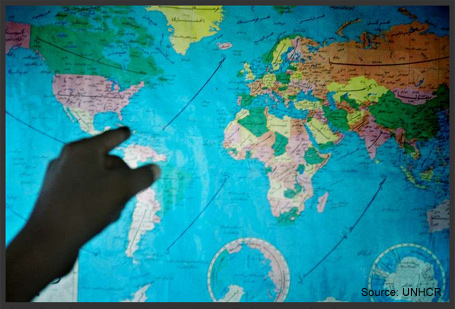International refugee law is based on treaties dating back to 1951 and 1967. Those documents provide that an individual with a “well-founded fear of being persecuted” in his or her home country for reasons of “race, religion, nationality, membership of a particular social group or political opinion” should not be sent back. The person should gain residency in the country where the person is now living, or be resettled in a safe third country.
South Korea has just granted refugee status to a gay man from Pakistan, who feared for his life at the hands of his family members back home. We have recently had accounts of ‘honour killings’ of lesbian or gay daughters or sons in some conservative Islamic communities. A South Korean court found the Pakistani man’s fears to be “well founded” and over-ruled an administrative decision to send him back home.
For perhaps two decades there have been cases in the West where countries have accepted that homosexuals are a “social group” for the purposes of refugee law. This interpretation has long been upheld by the UN High Commission for Refugees (UNHCR), based in Geneva. In 2008 the UNHCR issued a Guidance Note on Refugee Claims relating to Sexual Orientation and Gender Identity, confirming that homosexuals and transgendered individuals are members of “social groups” and therefore within the scope of refugee law. So there may well have been other cases in Asia where LGBT individuals, with well founded fears of persecution, have been granted refugee status by an Asian government.
Simply coming from a country with a criminal law prohibition (as in Singapore or Malaysia) is not enough to get you into the US or Canada or Germany or the UK. Those criminal laws are not routinely or systematically enforced. But I know of at least one Malaysian who gained refugee status in the US. He had been hassled and threatened by police for being in a cruising area. A bribe got him out of custody, but left him in fear.
Most countries in Asia have not signed the refugee conventions. Who has?
Outside central Asia, signatories are Cambodia, China, Japan, South Korea, the Philippines, Seychelles, and Timor Leste. South Asian countries have agreements with each other to try to handle refugee flows across their borders, but they refuse to sign the international treaties. So Bangladesh, Bhutan, India, Maldives, Nepal, Pakistan and Sri Lanka are non-signers.
Looking at the ASEAN neighborhood, we find that eight of the ten ASEAN members have not signed. Only the Philippines and Cambodia have signed on. So the exodus of Rohingya people from western Myanmar was wholly outside the legal framework of international refugee law. Many are in refugee camps in Bangladesh (a non-signer). Many got by boat to Malaysia (another non-signer).
The UNHCR has in fact been playing a role in the region, in spite of the lack of a legal framework. They actually arranged for some repatriation of Rohingya back to Myanmar, convinced that it was safe. ASEAN as well has tried to get Myanmar to recognise obligations based on citizenship, not on refugee law. UNHCR has played some role in refugee issues in Thailand, though its protests about the Christmas-time forced return of Hmong from Thailand to Laos were unheeded. Thailand has said many times that it regards those Hmong as economic refugees (who cannot claim rights under the refugee treaties).
International refugee law does recognise LGBT people as potential refugees. But most Asian countries do not recognise international refugee law.
Doug Sanders is a retired Canadian law professor, living in Bangkok. He can be contacted at sanders_gwb @ yahoo.ca.

